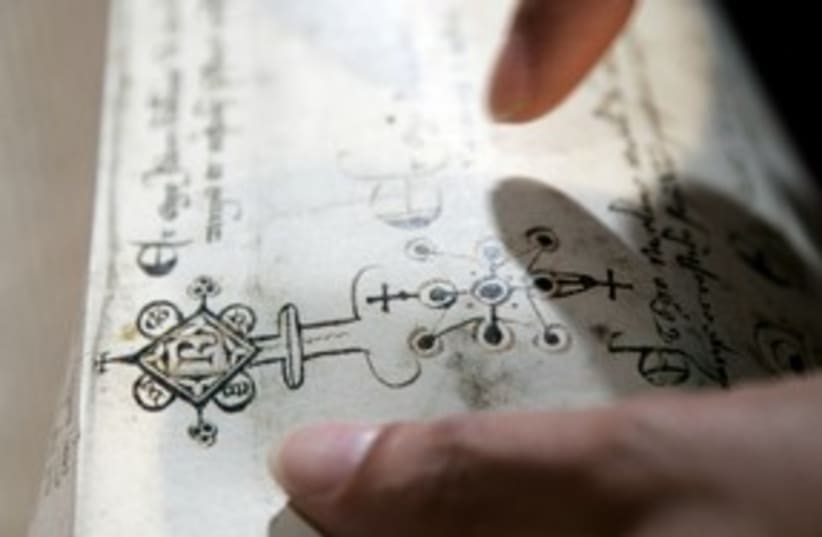Closely guarded for over a millennium, one hundred historical documents from the Vatican’s archives are going on display in at the Capitoline Museum in Rome over the next few months. Interested members of the general public, for the first time in history, will be able to peruse correspondence and legal documents related to the most important events in European history, including the divorce of British King Henry VIII from his wife Catherine of Aragon and the trial of the astronomer Galileo Galilei for heresy in connection with his proposition that, in fact, the earth rotated around the sun.
The Vatican maintains a highly-secured underground facility, known as the Secret Archive, which has more than 40 miles of shelves stacked with priceless historical documents. In honor of the 400th anniversary of the Secret Archives, the exhibition, “Lux in Arcana: The Vatican Secret Archives Revealed,” comprises the largest number of documents to ever leave the small, independent city-state.
Whether your interest lies in the enigmatic Knights Templar, the last appeal of Mary, Queen of Scots to Pope Sixtus V before she was executed by Elizabeth I or in the alleged silence of Pope Pius XII during the Nazi atrocities of the Second World War, the Vatican documents will shed light on many significant events.
We may be tempted at times to believe that we are now uniquely vexed by insurmountable challenges and that the political machinations of our ruling classes are the most appalling and ignoble. Any casual reading of the historical record will soon reveal that, in fact, many of the same problems have lingered around us for generation after generation.
When we try to analyze the long-term impact of the succession in North Korea of Kim Jong-un after the early death of his father Kim Jong-il, as well as the wave of purges, executions and “accidents” that may follow as the younger Kim strengthens his grip on power, we are witnessing both the immediate events transpiring on the Korean Peninsula and also a reenactment of thousands of successions that have taken place in ruling families for millennia.
British poet and playwright William Shakespeare was known not only for his pithy new turns of phrase, but also for his compelling portrayals of the human drama that unfolds at the very heart of the governance of a state when an older order is threatened by a newer one.
The rise of China, the premier economic power of the 21st century, will lead to many changes in the way global trade and international diplomacy are conducted. However, there have been dozens of global powers that have been identified as rising stars in the past. Some have achieved lasting significance, while others have frittered away their comparative advantages relatively quickly.
It is hard now to envision a time with the Dutch and the Portuguese sat at the top table of world affairs, with vast commercial empires that spread across the globe. Their time came and, soon, their time passed.
Accordingly, the transitions that China is undergoing will not necessarily guarantee its people prosperity and stability. Senior communist official Zhu Mingguo, who successfully defused an open revolt by disgruntled Chinese in the village of Wukan, this week compared his country to a shiny apple that is, in fact, rotten to the core. He urged Chinese rulers to be prepared for further protests from a disgruntled public that is growing more aware of democracy and equality and will make greater demands on the ruling elite to deliver on their promises.
British novelist Charles Dickens was better than many at recounting the social impacts of economic change on communities caught in the crossfire of industrial revolutions. Individual lives are ultimately where the rubber meets the road when new technologies and new economic models disrupt the way in which people had previously lived.
Russian Prime Minister Vladimir Putin is currently grappling with widespread social unrest and dissatisfaction with his attempt to regain the Kremlin once again. He has belittled the growing protest movement in his country, which seeks to derail his campaign as the March 4th presidential elections rapidly approach. Dismissing allegations that the recent December 4th parliamentary elections were plagued by fraud, Putin confidently claims he can easily win re-election without lowering himself to dirty tricks.
In his idle hours between public addresses to his loyal followers and photo opportunities at the judo tournaments he is widely known to favor, Putin might be well advised to catch actress Meryl Streep’s compelling portrait of former British prime minister Margaret Thatcher in the film, “The Iron Lady.” He may see uncomfortable harbingers in a portrayal of a leader simultaneously revered and hated for her decisiveness and tenacity in pursuit of her political goals.
One wonders whether Thatcher would ultimately have faced such a betrayal by her own party members and such lingering hatred by her opponents if she had instead gracefully bowed out after her second term in office. Putin should consider his own views on this question.
As we reach the end of 2011, the opening of the Vatican vaults reminds us that we are often well rewarded by looking back in history when facing our current challenges. The past is rich in lessons that can be learned relatively painlessly and can be applied, with a little alteration and customization, to solve the “new problems” that we face every day.
The writer is a commentator who divides his time between the United Kingdom and Southern California. He has appeared on CNN, CNBC, BBC and Sky News, and has been featured in the New York Times, the Wall Street Journal, the Washington Post, the Financial Times and the Economist.
